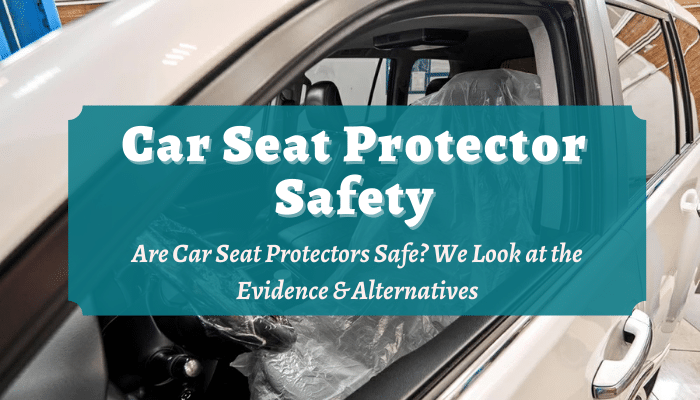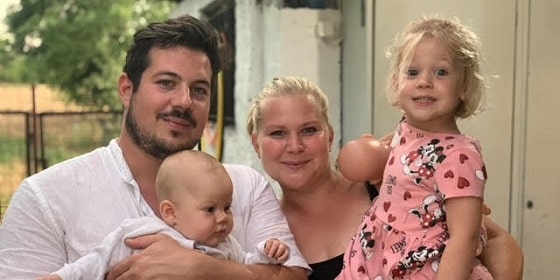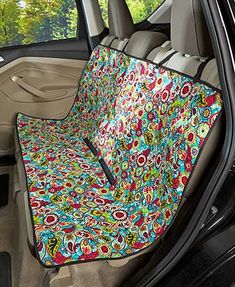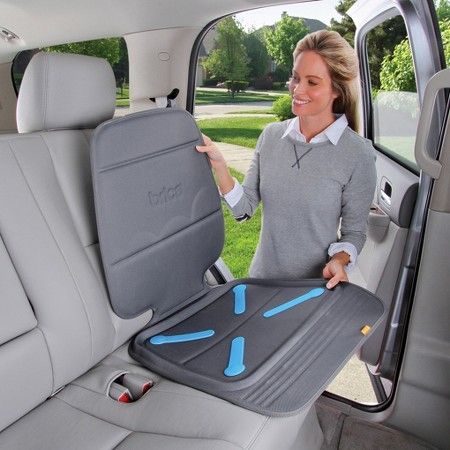
Car seat protectors are a popular accessory that has piqued the interest of parents all over America. Their popularity can be attributed to their ability to reduce mess and clean-up time as well as prevent damage that can be done to your vehicle’s upholstery by your child’s car seat.
As with any car seat accessory, it’s important to know whether or not the use of a car seat protector is safe. In most cases, it’s hard to prove if a car seat accessory is safe because most are made by third-party companies that have no government regulation.
Before we get into the article, I would like to quickly discuss what it means to be government-regulated…
According to the Cambridge Dictionary, government regulation is "a law that controls the way a business can operate...". Car seats are a prime example of something that is government-regulated. This means that there are certain requirements and standards that car seats have to meet to be certified safe to use. Without government regulation, anybody could make a car seat and say that they're safe to use, but there would be no way to prove that without some sort of regulation being in place.
To be considered safe to use, car seats must meet the Federal Motor Vehicle Safety Standard 213 (FMVSS). The FMVSS is what determines how car seats should perform and what criteria needs to be met to meet this standard. Car seat manufacturers are expected to self-certify that their products meet and exceed FMVSS, and if they do, their products are given a label so that customers know for certain that the car seat has, at least, been crash-tested.
Likewise, most car seat manufacturers that produce car seat accessories, such as car seat protectors, will have them crash-tested with their car seats to make sure that they won't interfere with the performance and safety of your child's car seat. For this reason, it's important to buy car seat accessories from your car seat manufacturer so that you can have the assurance that it's government-regulated.
In this article, we’ll be discussing in more detail what car seat protectors are and why, depending on where you buy them, they can be dangerous. We’ll also learn if car seat protectors are crash-tested and what you can do to test the safety of your car seat protector. Afterward, we’ll explore safe alternatives that you can use as a car seat protector.
What is a Car Seat Protector?
Car seat protectors are an accessory that’s designed to protect your vehicle’s upholstery from wear and tear. Most parents use them to protect their vehicle’s seats from messy children and any potential damages that could be caused by their child’s car seat. Just as there are different types of vehicles out there, there are different types of seat protectors - three, to be exact:
Bench Seat Protectors
Bench seat protectors are designed for more traditional-looking backseats. They’re a one-piece cover that protects the entire backseat, and they’re meant to keep mess and debris from getting in between the seats.
Most people use this type of seat protector to protect their vehicle seats from pets and liquids. The problem, however, is that some bench protectors don’t have areas for the seat belt buckle to come through, so that’s something you’ll have to watch out for if you’re using this type of car seat protector.
Back of Seat Protectors
It’s common for children who ride in their car seat in the forward-facing position to kick and rest their feet on the seat in front of them. If you’ve noticed this with your little one, then this is the type of car seat protector that may interest you the most.
Back of seat protectors are designed to cover the back of the driver and passenger seats to reduce the mess that’s caused by dirty shoes.
Typically, back of seat protectors will come with pockets for added storage space because they tend to block access to the pockets that are on the back of your vehicle seats.
Bucket Seat Protectors
Bucket seat protectors are designed to cover a single seat and they’re typically designed specifically for the seat that needs protection. Most parents, if there’s one passenger in the back seat, will use this type of protector. It’s a suitable choice if you’re looking for a car seat protector that will solely protect your vehicle seat from your child’s car seat or if you have an SUV.
One of the downsides to using a bucket seat protector is that they can’t be used on the middle seat, so if that’s where your child sits, then you’ll have to move them to one of the side seats.
What Makes Car Seat Protectors Dangerous?
Before I can answer what it is that makes car seat protectors dangerous, we first have to ask ourselves IF they’re dangerous. The answer to that is...there is no definite answer; it all boils down to what type of car seat you have. Here, let me explain.
If you were to ask any CPST (Child Passenger Safety Technician) if car seat protectors are safe, they would tell you it depends on where you get it from. The reason being is because some car seat manufacturers produce their own brand of car seat protectors, and then there are a lot of third-party companies out there who make them as well. But, what’s dangerous about that?
Well, if you purchase a car seat protector from your car seat manufacturer, chances are that it’s been crash-tested to ensure that it’s safe to use. Accessories that are made by car seat manufacturers have to be crash-tested because they’re held to much higher safety standards than third-party companies. So, buying a car seat protector from your car seat manufacturer isn’t dangerous, but buying one from an aftermarket company is.
Most third-party companies that claim that their accessories are safe to use have no way to back up what they claim because they haven’t crash-tested their products. If they have, that doesn’t necessarily mean that their accessories are safe to use because they haven’t been tested with your child’s car seat, so there’s no guarantee that it’ll be safe to use these accessories with your child’s car seat. That’s one of two reasons why car seat protectors can be dangerous.
The second reason why car seat protectors are dangerous is because they can interfere with your car seat installation. Car seats are designed to fit directly against your vehicle seat, but a car seat protector can get in the way of that and can easily mask incorrect car seat installation. Because of this, most experts feel that using car seat protectors are too much of a risk.
Are Car Seat Protectors Crash-Tested?
It’s safe to assume that the car seat manufacturers that make car seat protectors have extensively crash-tested them with their car seats to assure that they’re safe to use.
On the contrary, most third-part companies claim that their products have been crash-tested and comply with federal safety standards, but here’s the catch: there are no federal safety standards for aftermarket products. There is no government regulation or rules for testing car seat accessories.
If you want a car seat protector that’s been crash-tested, it’s safest to buy one from your car seat manufacturer.
Safer Alternatives to a Car Seat Protector?
If you’ve made to this portion of the article and you’re a little iffy on purchasing a car seat protector, that’s okay! There are two safer alternatives that I’d recommend in place of the car seat protector.
Receiving Blanket
Receiving blankets are made out of a thin material that won’t interfere with your car seat installation. The main problem with most car seat protectors is that they’re bulky and can make it seem like you’ve installed your car seat correctly when really you haven’t. That’s why receiving blankets are a highly recommended alternative by car seat experts. They’re so thin that you can easily and securely install your car seat, and you’ll be able to clearly see if the car seat is installed loosely.
Towel
Thin towels work just the same as receiving blankets. They’re also made out of thin material, so they would hardly get in the way of your child restraint and the vehicle seat.
Sometimes, parents will fold the towel so that there are more layers between the vehicle seat and car seat. While this may work for some people, you should know that doing this can add too much bulkiness and block the child restraint.
To test the safety of both of these alternatives, follow the same crash-test steps as you would with the car seat protector. Again, if you remove the towel after you've installed the car seat and find that it has too much wiggle room, then you shouldn't use it as a seat protector.
Car Seat Protector For Child & Baby Car Seats
Conclusion
Car seat protectors are a popular car seat accessory that, while convenient, can be dangerous to use. They're dangerous because they can interfere with your car seat installation, which can put your child at risk of serious injury.
Also, if you purchase a car seat protector from a third-party company, there's no way to tell if it's safe to use because companies such as thee are not government-regulated, so there' no rules that they have to follow to ensure that their products are safe.
One of the safest things you can do, if you're interested in buying a car seat protector, is purchase one from your car seat manufacturer. By doing that, you can rest assured that the car sea protector has been crash-tested with your child's car seat and will not impair its performance and safety. Another thing you can do is crash test the car seat protector yourself by following the steps that I outlined earlier.
If you find that your car seat protector is unsafe to use, try using a receiving blanket or a thin towel in place of it. They're safer to use and they won't get in the way of your car seat installation.
Remember, if the accessory NOT approved by your car seat manufacturer, DO NOT USE IT.

Growing up I was a carefree male going about life like there was no tomorrow. Naturally, I ‘grew’ up, settled down and started a family.

Going from an independent carefree male to a family man was somewhat of a U-turn and required a lot of learning. Luckily for me, my wife works in education and has always been the shining light always ahead of me on all factors kids related.
Initially, my wife didn’t have a driving license (luckily this has now changed and it does make life easier), and all things car related were my task. Child locks were the obvious starting point which lead me down a rabbit hole.
So far we have personally tested dozens of convertible car seats and have owned five despite neither of our kids having reached the age of 5! Simply put, a car seat can be great on paper, work great on trying out but can fail on you in real life.
This is why I have put together this website – to help inform and educate you!
Of course, as I mentioned above, at the end of the day your experience will be the best test so I’d love to hear your experiences and feedback in the comments.
To contact me personally, please do so through my contact page.
I look forward to hearing from you!
Peter
P.S. If you click a link on my site and end up buying a car seat on Amazon, I’ll get paid a small commission (or as the Amazon lawyers put it: “As an Amazon Associate I earn from qualifying purchases”)


I was going to purchase rear seat protector for Mazda CX-5 2921 from Mazda. They talk about side airbag safety etc it’s neoprene. It sounds like I should call the Car seat manufacturer?. I purchased new car seats. Graco extend 2fit(daughters told me to purchase)